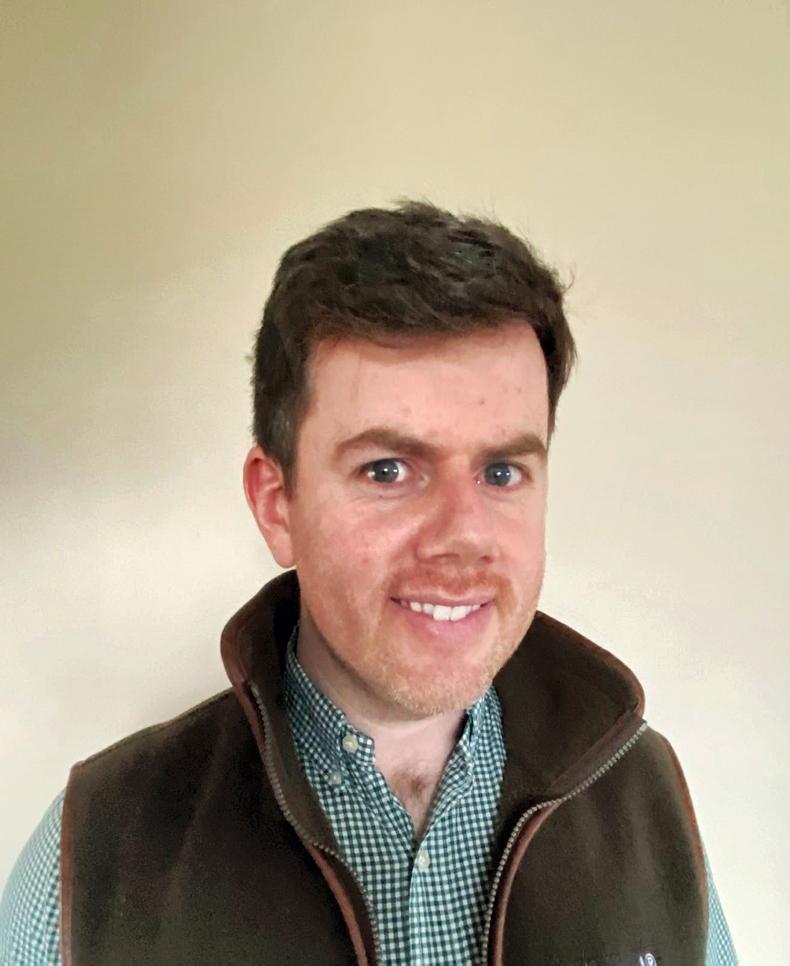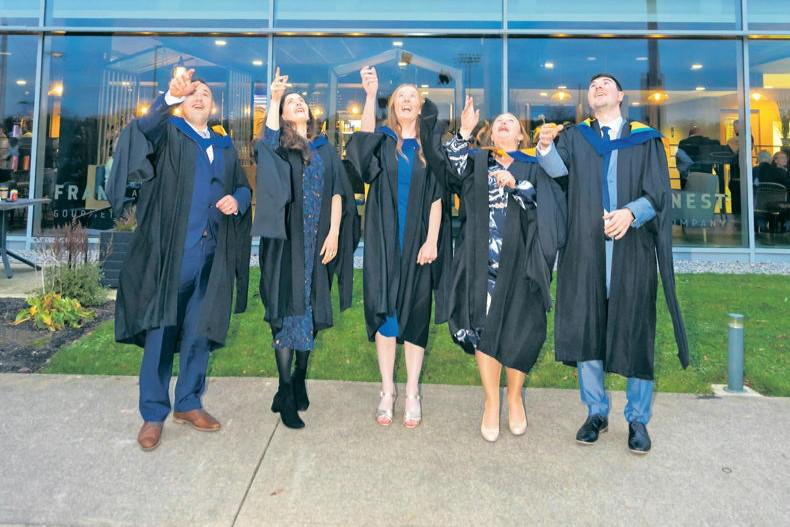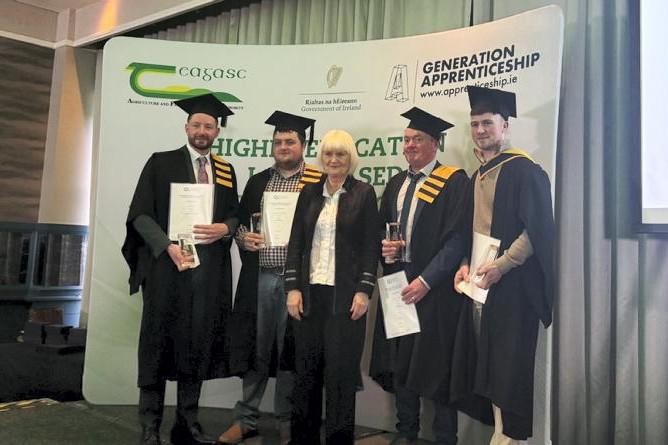With the new Climate Action Plan aiming to increase the total tillage area to 360,000 ha by 2025 and 400,000 ha by 2030, farmers are being encouraged to move to the sector. This is creating a demand for agronomists and other positions in the industry.
There are great opportunities in the tillage sector at the moment, according to Irish Farmers Journal tillage editor, Siobhan Walsh.
“The current shortage of trained agronomists and the push for more independent advisers from the new Sustainable Use of Pesticides Regulations means there is - and will be - plenty of job opportunities in tillage,” she says.
“The sector has a low carbon footprint and this brings new roles and requirements. For example, if tillage’s potential is realised in lowering Ireland’s greenhouse gas emissions, jobs could open up in carbon measurement.”
The Harvest Report published by Teagasc estimates that the production of cereals was 2.42 million tonnes in 2022. This represents an increase of 93,200 tonnes (4%) from harvest 2021. Also outlined in 2022 were record yields in spring barley, oilseed rape and spring oats.
CEO of Acorn Independent Merchants

Barry Larkin, CEO of Acorn Independent Merchants.
In 2021, Barry Larkin took up the role of CEO of the Acorn Group; representing a group of long-established independent agri-business merchants around Ireland. Formed in the late 1990s, it was one of the first of such groups in the industry. Barry explains: “There are around 2.2 million tonnes of native grains in this country, most years, and the Acorn group will purchase 500,000 tonnes of that 2.2m.” Barry says that all 10 companies across the Acorn organisation have a requirement for agronomists.
Career pathway
From a beef and tillage farm in Coolderry, Co Offaly, Barry always wanted to ?study agricultural science. Following his degree in animal and crop production from University College Dublin (UCD) his home farm experience of growing malting barley swayed him down the tillage route.
In 2012, he won the Irish Tillage and Land Use Society (ITLUS) bursary award and went on to do a master’s degree in crop science. Barry says, “That was a great grounding.
With travel on the agenda, Barry set off to Australia, where he lived for three years. There, he worked for the largest independent agronomist company in the country: Kalyx Australia.
“It was a fantastic experience,” he tells Irish Country Living.
On his return to Ireland, he worked in a commercial role at Croplink (supplier of generic and post patent plant protection products) for four years. This role taught him that “Outside of research you have to be commercially astute - you have to understand the financials involved in any form of agriculture. That is what propelled me into the job I am in today.”
Opportunities in the sector
The tillage sector is a smaller industry than most, resulting in career progression opportunities for ambitious graduates.
Barry believes that the arable sector will play a huge role in [Irish] carbon emissions reduction and the production of native grains to feed the livestock sector.
Trader R&H Hall

From a sheep farm in Co Louth, Philip Lynch is now responsible for soya bean meal and whole soya purchase for R&H Hall. The majority of these commodities are imported from Argentina and the US which sees him traveling there frequently “to connect with suppliers, build on relationships and get a good understanding of the supply chain” he says.
“I never saw myself doing anything other than something in the agri-sector,” he tells Irish Country Living. “The strength of ag science is it doesn’t railroad you into anything in particular.” Philip completed his degree in Agricultural Science from UCD, specialising in food and agribusiness management and graduated in 2008.
For his final year thesis, Philip wanted to work alongside an established business in the agri-food sector. A lecturer connected him with United Fish Industries (UFI), a company in the UK who are part of Origin Enterprises. Philip says, “It opened my mind up to the global nature of ingredients used in feed rations.” R&H Hall, a sister company of UFI, was looking for graduates to work as junior trainees, and Philip started with them in 2008 on the trading desk. After a couple of years, he progressed within the company becoming responsible for “a trading book and all that goes with that” and 15 years on, he is still there.
Opportunities arise in various businesses
Speaking on the opportunities in the sector, Philip explains, “The tillage sector has massive potential; we buy a significant amount of Irish grain every year. We see great opportunities in that, the Irish product is an excellent product and there is a greater push towards consuming greater quantities of native grains.
Philip also sees opportunities in terms of building the food usage of the grains that are grown. “I think it’s a very exciting place in the ag sector and it will only increase going forward as we face into various environmental legislation.”
Conroy Crop Consultancy
Services Ltd

Joe Conroy is a self-employed agronomist and a member of the Irish Tillage Consultants Association. He has been providing advice on crop management, pesticides and weed control to tillage farmers for many years.
Joe grew up on a farm in Dundalk that had sheep, cows and tillage. When he completed his general agriculture degree from UCD in 1977, there was no specific tillage course, whereas now there is a specific crop science route offered by the university. He completed two years in UCD before doing a practical year ?on UCDs practical farm Lyons Estate near Celbridge, Co Kildare. “In those days, you had to prove you had experience with all aspects of agriculture,” he tells Irish Country Living. He then completed fourth and fifth year in UCD.
Joe went on to do a two year masters on wheat-controlled systems in sugar beet, also ?in Lyons Estate before becoming a technical sales rep with Shell, where he worked from 1980. The company changed ownership during his time there, as the agri chemical side of Shell was taken over by Cyanamid and then by BASF both of which are chemical companies.
After being approached by five or six farmers who said, “Listen Joe, we just want the advice - we don’t want the chemicals,” he made the leap to work for himself. Between all of his farming clients, there was 5,000 acres of crops to manage. “I started working, we agreed on terms and that was it - I have been working ever since,” he says.
Advice for students
For young people looking to work in the industry, Joe advises gaining experience with a wholesaler. He maintains “it is a different type of experience” as it is important to have a broad perspective as you learn to pigeonhole specific products with crops. Joe adds “Pick one area that you’re good at and stick to it.”
Read more
Young Stock Podcast: being an executive director at a young age
The benefits of a PhD in genetic research
With the new Climate Action Plan aiming to increase the total tillage area to 360,000 ha by 2025 and 400,000 ha by 2030, farmers are being encouraged to move to the sector. This is creating a demand for agronomists and other positions in the industry.
There are great opportunities in the tillage sector at the moment, according to Irish Farmers Journal tillage editor, Siobhan Walsh.
“The current shortage of trained agronomists and the push for more independent advisers from the new Sustainable Use of Pesticides Regulations means there is - and will be - plenty of job opportunities in tillage,” she says.
“The sector has a low carbon footprint and this brings new roles and requirements. For example, if tillage’s potential is realised in lowering Ireland’s greenhouse gas emissions, jobs could open up in carbon measurement.”
The Harvest Report published by Teagasc estimates that the production of cereals was 2.42 million tonnes in 2022. This represents an increase of 93,200 tonnes (4%) from harvest 2021. Also outlined in 2022 were record yields in spring barley, oilseed rape and spring oats.
CEO of Acorn Independent Merchants

Barry Larkin, CEO of Acorn Independent Merchants.
In 2021, Barry Larkin took up the role of CEO of the Acorn Group; representing a group of long-established independent agri-business merchants around Ireland. Formed in the late 1990s, it was one of the first of such groups in the industry. Barry explains: “There are around 2.2 million tonnes of native grains in this country, most years, and the Acorn group will purchase 500,000 tonnes of that 2.2m.” Barry says that all 10 companies across the Acorn organisation have a requirement for agronomists.
Career pathway
From a beef and tillage farm in Coolderry, Co Offaly, Barry always wanted to ?study agricultural science. Following his degree in animal and crop production from University College Dublin (UCD) his home farm experience of growing malting barley swayed him down the tillage route.
In 2012, he won the Irish Tillage and Land Use Society (ITLUS) bursary award and went on to do a master’s degree in crop science. Barry says, “That was a great grounding.
With travel on the agenda, Barry set off to Australia, where he lived for three years. There, he worked for the largest independent agronomist company in the country: Kalyx Australia.
“It was a fantastic experience,” he tells Irish Country Living.
On his return to Ireland, he worked in a commercial role at Croplink (supplier of generic and post patent plant protection products) for four years. This role taught him that “Outside of research you have to be commercially astute - you have to understand the financials involved in any form of agriculture. That is what propelled me into the job I am in today.”
Opportunities in the sector
The tillage sector is a smaller industry than most, resulting in career progression opportunities for ambitious graduates.
Barry believes that the arable sector will play a huge role in [Irish] carbon emissions reduction and the production of native grains to feed the livestock sector.
Trader R&H Hall

From a sheep farm in Co Louth, Philip Lynch is now responsible for soya bean meal and whole soya purchase for R&H Hall. The majority of these commodities are imported from Argentina and the US which sees him traveling there frequently “to connect with suppliers, build on relationships and get a good understanding of the supply chain” he says.
“I never saw myself doing anything other than something in the agri-sector,” he tells Irish Country Living. “The strength of ag science is it doesn’t railroad you into anything in particular.” Philip completed his degree in Agricultural Science from UCD, specialising in food and agribusiness management and graduated in 2008.
For his final year thesis, Philip wanted to work alongside an established business in the agri-food sector. A lecturer connected him with United Fish Industries (UFI), a company in the UK who are part of Origin Enterprises. Philip says, “It opened my mind up to the global nature of ingredients used in feed rations.” R&H Hall, a sister company of UFI, was looking for graduates to work as junior trainees, and Philip started with them in 2008 on the trading desk. After a couple of years, he progressed within the company becoming responsible for “a trading book and all that goes with that” and 15 years on, he is still there.
Opportunities arise in various businesses
Speaking on the opportunities in the sector, Philip explains, “The tillage sector has massive potential; we buy a significant amount of Irish grain every year. We see great opportunities in that, the Irish product is an excellent product and there is a greater push towards consuming greater quantities of native grains.
Philip also sees opportunities in terms of building the food usage of the grains that are grown. “I think it’s a very exciting place in the ag sector and it will only increase going forward as we face into various environmental legislation.”
Conroy Crop Consultancy
Services Ltd

Joe Conroy is a self-employed agronomist and a member of the Irish Tillage Consultants Association. He has been providing advice on crop management, pesticides and weed control to tillage farmers for many years.
Joe grew up on a farm in Dundalk that had sheep, cows and tillage. When he completed his general agriculture degree from UCD in 1977, there was no specific tillage course, whereas now there is a specific crop science route offered by the university. He completed two years in UCD before doing a practical year ?on UCDs practical farm Lyons Estate near Celbridge, Co Kildare. “In those days, you had to prove you had experience with all aspects of agriculture,” he tells Irish Country Living. He then completed fourth and fifth year in UCD.
Joe went on to do a two year masters on wheat-controlled systems in sugar beet, also ?in Lyons Estate before becoming a technical sales rep with Shell, where he worked from 1980. The company changed ownership during his time there, as the agri chemical side of Shell was taken over by Cyanamid and then by BASF both of which are chemical companies.
After being approached by five or six farmers who said, “Listen Joe, we just want the advice - we don’t want the chemicals,” he made the leap to work for himself. Between all of his farming clients, there was 5,000 acres of crops to manage. “I started working, we agreed on terms and that was it - I have been working ever since,” he says.
Advice for students
For young people looking to work in the industry, Joe advises gaining experience with a wholesaler. He maintains “it is a different type of experience” as it is important to have a broad perspective as you learn to pigeonhole specific products with crops. Joe adds “Pick one area that you’re good at and stick to it.”
Read more
Young Stock Podcast: being an executive director at a young age
The benefits of a PhD in genetic research












SHARING OPTIONS